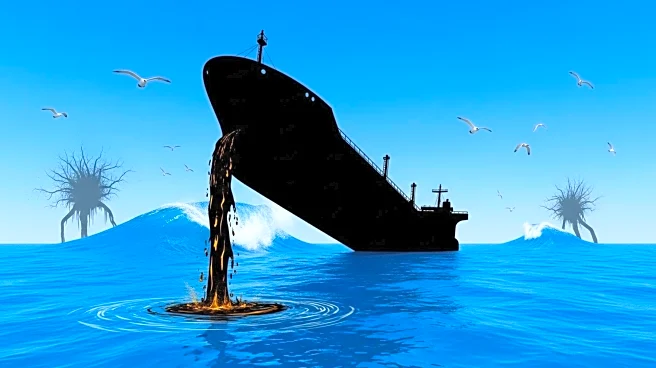What's Happening?
Recent findings reveal that Russian tankers, blacklisted by the EU, continue to discharge oil into European seas, despite sanctions aimed at curbing such activities. Satellite footage and shipping data have documented oil spills by these tankers, part of a 'shadow fleet' used by Russia to bypass Western sanctions. This fleet, consisting of over 1,300 vessels, is linked to significant oil spills and damage to subsea infrastructure. The EU has blacklisted 444 vessels, preventing them from docking at EU ports or using Western services, while the UK has sanctioned 450 vessels. However, the effectiveness of these measures is questioned as the tankers, often underinsured and with opaque ownership, continue to operate, posing environmental risks.
Why It's Important?
The ongoing oil spills by Russian tankers highlight the challenges faced by Western governments in enforcing sanctions and protecting their waters from ecological disasters. The situation underscores the limitations of current sanctions, as the shadow fleet's operations continue largely unchecked. This has significant implications for environmental safety and the enforcement of international maritime regulations. The EU's struggle to effectively sanction these vessels could embolden other nations to exploit similar loopholes, potentially leading to increased environmental risks and undermining global efforts to hold violators accountable.
What's Next?
The EU plans to expand its sanctions by targeting the entire value chain involved in transporting sanctioned oil, including refineries and commercial registries. Diplomatic pressure is also being applied to flag states to prevent these vessels from operating. However, the effectiveness of these measures remains uncertain, as the shadow fleet's operations continue to pose significant challenges. The EU and its allies may need to explore additional strategies to enhance the enforcement of sanctions and mitigate environmental risks.
Beyond the Headlines
The persistence of oil spills by sanctioned Russian tankers raises ethical and legal questions about the responsibility of flag states and the international community in preventing environmental damage. The situation also highlights the need for more robust international cooperation and regulatory frameworks to address the challenges posed by shadow fleets and ensure accountability for environmental violations.









